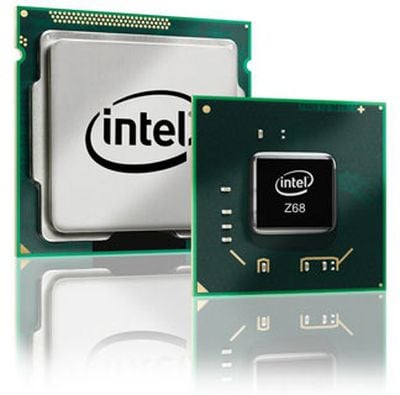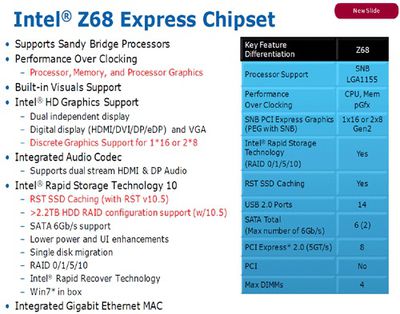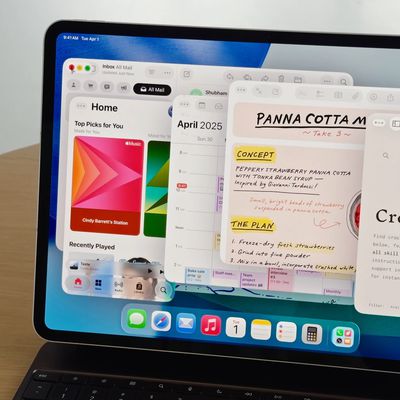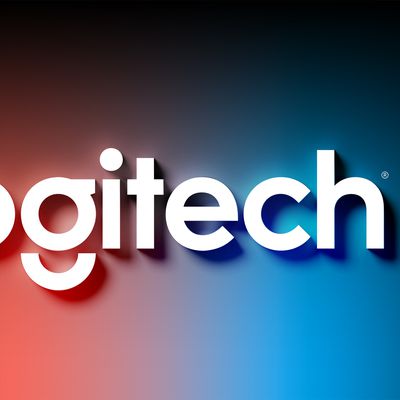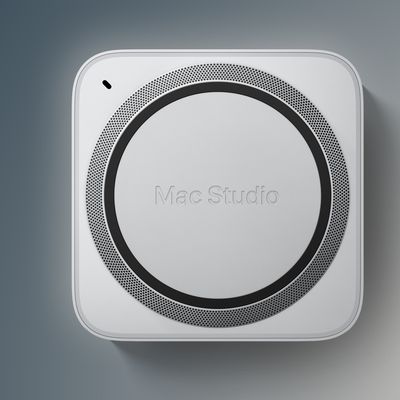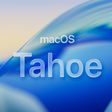Intel's Z68 Chipset to Bring SSD Caching to Sandy Bridge
VR-Zone reports (
via Hardmac) that Intel has begun production of its new "Z68" chipset for Sandy Bridge-based processors, with availability set for May. Most notably in light of rumors regarding the new MacBook Pro that failed to materialize, the Z68 chipset will support Intel's Rapid Storage Technology SSD caching.
Interestingly, Intel has also started production of their Z68 chipset this week along with other Cougar Point SKUs like H61 and Q65. All of them are based on the new B3 stepping therefore the SATA port 2-5 issue is fixed before they hit the market. Judging from the specs, it seems Intel has catered Z68 specially for enthusiasts which allows better processor overclocking, discrete graphics support and SSD caching capability.
SSD caching marries a conventional hard drive to a relatively small solid-state drive (SSD), with the most frequently-accessed data automatically placed on the SSD for fast access while the two drives appear to users simply as a single drive. The functionality serves to bring users much of the speed benefit of SSDs but with the storage capacity and lower cost of traditional hard drives.
Several rumors in the days leading up to last week's MacBook Pro refresh
claimed that the updated models would offer a dedicated SSD to host the operating system and other essential files. The claims did not, however, come to fruition.
Update: To be clear, the Z68 chipset is for desktop implementations.
Popular Stories
The iPhone 17 Pro and iPhone 17 Pro Max are three months away, and there are plenty of rumors about the devices.
Below, we recap key changes rumored for the iPhone 17 Pro models as of June 2025:Aluminum frame: iPhone 17 Pro models are rumored to have an aluminum frame, whereas the iPhone 15 Pro and iPhone 16 Pro models have a titanium frame, and the iPhone X through iPhone 14 Pro have a...
iPadOS 26 allows iPads to function much more like Macs, with a new app windowing system, a swipe-down menu bar at the top of the screen, and more. However, Apple has stopped short of allowing iPads to run macOS, and it has now explained why.
In an interview this week with Swiss tech journalist Rafael Zeier, Apple's software engineering chief Craig Federighi said that iPadOS 26's new Mac-like ...
Alongside WWDC this week, Logitech announced notable new accessories for the iPad and Apple Vision Pro.
The Logitech Muse is a spatially-tracked stylus developed for use with the Apple Vision Pro. Introduced during the WWDC 2025 keynote address, Muse is intended to support the next generation of spatial computing workflows enabled by visionOS 26. The device incorporates six degrees of...
Apple will finally deliver the Apple Watch Ultra 3 sometime this year, according to analyst Jeff Pu of GF Securities Hong Kong (via @jukanlosreve).
The analyst expects both the Apple Watch Series 11 and Apple Watch Ultra 3 to arrive this year (likely alongside the new iPhone 17 lineup, if previous launches are anything to go by), according to his latest product roadmap shared with...
Apple's iPhone development roadmap runs several years into the future and the company is continually working with suppliers on several successive iPhone models simultaneously, which is why we often get rumored features months ahead of launch. The iPhone 17 series is no different, and we already have a good idea of what to expect from Apple's 2025 smartphone lineup.
If you skipped the iPhone...
Apple today provided developers with a revised version of the first iOS 26 beta for testing purposes. The update is only available for the iPhone 15 and iPhone 16 models, so if you're running iOS 26 on an iPhone 14 or earlier, you won't see the revised beta.
Registered developers can download the new beta software through the Settings app on each device.
The revised beta addresses an...
Apple today added Mac Studio models with M4 Max and M3 Ultra chips to its online certified refurbished store in the United States, Canada, Japan, Singapore, and many European countries, for the first time since they were released in March.
As usual for refurbished Macs, prices are discounted by approximately 15% compared to the equivalent new models on Apple's online store. Note that Apple's ...
